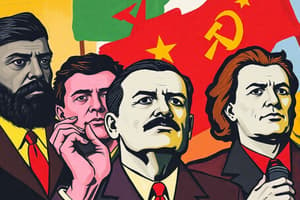Podcast
Questions and Answers
What is fascism?
What is fascism?
A one party system of government in which each class has its distinct place but the individual is subject to the state and control is maintained by military force, secret police, and governmental regimentation of industry and finance.
What does totalitarian mean?
What does totalitarian mean?
A one party government maintained by political suppression usually combined with cultural and economic controls.
Germany's economy was near collapse due to the harsh terms of the Treaty of Versailles.
Germany's economy was near collapse due to the harsh terms of the Treaty of Versailles.
True (A)
The frustration of the European depression gave rise to democratic governments.
The frustration of the European depression gave rise to democratic governments.
Communism and fascism are two forms of totalitarianism.
Communism and fascism are two forms of totalitarianism.
Germany, Italy, and Japan increased their military might to recover from their economic depression.
Germany, Italy, and Japan increased their military might to recover from their economic depression.
Japan's seizure of Manchuria led to increased Japanese expansion through China and the Pacific.
Japan's seizure of Manchuria led to increased Japanese expansion through China and the Pacific.
Military build up _____ industrial production and ______ unemployment.
Military build up _____ industrial production and ______ unemployment.
Flashcards are hidden until you start studying
Study Notes
Fascism
- Defined as a one-party government system where the individual is subordinate to the state.
- Characterized by class stratification, with distinct roles for each class.
- Control maintained through military force, secret police, and regulation of industries and finances.
Totalitarianism
- A political system where a single party governs with strict political suppression.
- Often involves economic and cultural controls alongside political dominance.
Treaty of Versailles Impact on Germany
- The harsh conditions imposed by the Treaty of Versailles led to a near collapse of Germany's economy.
European Depression and Democratic Governments
- The assertion that the European depression gave rise to democratic governments is false; it often led to instability and the rise of totalitarian regimes.
Totalitarianism Forms
- Both communism and fascism are recognized as forms of totalitarianism, enforcing similar strategies of control.
Military Strength and Economic Recovery
- Germany, Italy, and Japan sought to overcome their economic difficulties through a significant increase in military capabilities.
Japanese Expansion
- Japan's invasion of Manchuria triggered further expansion throughout China and into the Pacific region.
Military Buildup Effects
- Increased military buildup correlates with rising industrial production and a reduction in unemployment.
Studying That Suits You
Use AI to generate personalized quizzes and flashcards to suit your learning preferences.




